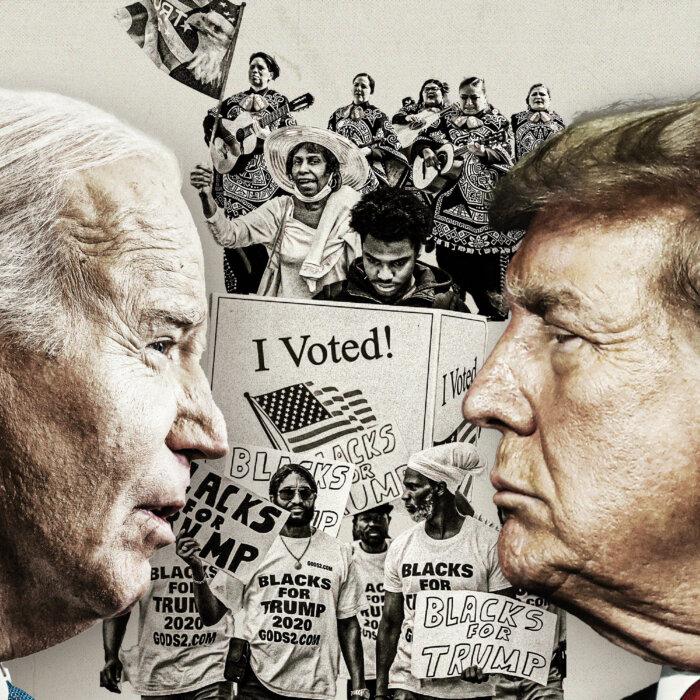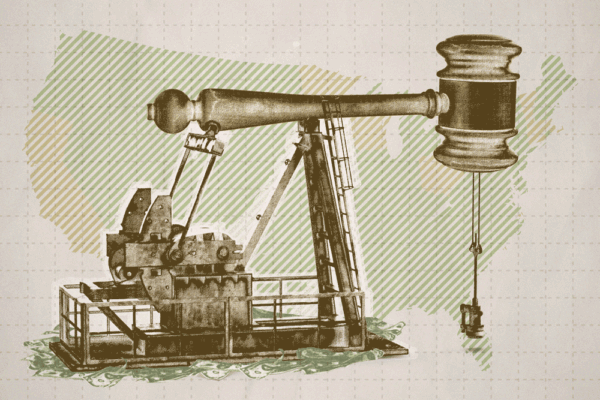MATTHEWS, N.C.—President Donald Trump’s national polling advantage has narrowed to less than one percent since he became the presumptive Republican nominee in the race for the White House.
In two Southern battlegrounds, Georgia and North Carolina, his lead looks stronger at five-and-a-half points and six points, respectively.
But can the region be written off as solidly Trump? The answer isn’t so obvious in key cities, counties, and polling places.
Local conservatives in an important purple patch in North Carolina worry their ground game is lacking.
On a pleasantly warm February day in Matthews, North Carolina, a thicket of campaign signs surrounded the local library. Inside, early voting was underway ahead of the state’s March 5 primary.
The site is at the intersection of blue America—heavily Democratic Charlotte—and the more Republican areas outside the city.
While Democrats dominate Mecklenburg County as a whole, this is a purple patch, trending red as Charlotte fades in the distance.
It’s the sort of place that Turning Point Action’s Chase the Vote Initiative might ignore, even if the group was targeting North Carolina.
Turning Point Action wants to drive up Republican turnout in deep red areas of three battlegrounds: Arizona, Wisconsin, and Michigan.
A spokeswoman for the Republican National Committee (RNC) declined to comment on the party’s strategy for the suburbs of Charlotte.
Scott Presler of Early Vote Action, another organization focused on driving up Republican voter turnout, didn’t respond to requests for comment.
On the ground, conservatives sense weakness.
“Republicans have got to organize the grassroots to the same level [as] the Democrats,” a local GOP insider told The Epoch Times.
That sentiment was echoed by every Republican and conservative from the area who spoke with The Epoch Times.
Some also worried the RNC isn’t spending enough, even after Michael Whatley, former chair of the North Carolina GOP, took over the national party from Ronna McDaniel. Mr. Whatley’s Democratic counterpart, 26-year-old Anderson Clayton, just got a gushing profile from Vogue alongside other Generation Z Democrats in the South.

On Feb. 19, when Mr. Whatley was still North Carolina’s state GOP chair, the organizational gap on the purple frontier was obvious.
Outside Matthews’ library, where representatives of political parties are allowed to hand out literature and speak with voters, there was one Republican to two Democrats. The local GOP insider said the Democrats often had even more volunteers on hand.
“We just work harder,” Jackie Goldberger, one of the two Democrats, told The Epoch Times.
In addition to being an area coordinator for the Democrats, Ms. Goldberger belongs to Indivisible Charlotte—part of a nationwide Indivisible network that has enjoyed support from the multi-billion dollar Arabella Advisors network.
Yet, vast fortunes are just part of the story. There’s also a lot of legwork by motivated liberals and Democrats.
Pastor Leon Threatt, a member of Matthews’ Board of Commissioners who has previously run for office as a Republican, told The Epoch Times that local Democrats “operate far more as activists than the Republicans.”
He drew attention to the rise of unaffiliated voters. Although organizations such as the Douglass Leadership Institute and the North Carolina Values Coalition are organizing Christian conservatives, the GOP proper may be lagging, at least in relative terms.
“I think more and more people are moving towards Republican policies, the conservative policies—and yet we’re not necessarily seeing in that a greater loyalty to the Republican Party,” he said.
But Democrats’ voter registration advantage in the state has also narrowed over the past few years. The party’s registration numbers have slowly fallen while Republican and unaffiliated registrations have grown.

Northern Transplants and Culture War
A state representative for the area, Tricia Cotham, made national headlines last year when she switched parties from Democrat to Republican, handing a veto-proof majority to the GOP before voting for a bill that outlawed abortions before 12 weeks under most circumstances.
The move elicited outrage from Democrats ahead of an election year and many of Indivisible’s events are focused specifically on ousting her.
Ms. Cotham, the newly minted Republican, is the daughter of Patricia Cotham, who has served on the Democratic National Committee (DNC). The elder Cotham lost the primary for her longtime Mecklenburg County Commission seat amid a backlash against her daughter’s party switch.
Dig a little deeper, and the culture wars became entangled with demographic shifts.
Explaining her party switch, the younger Ms. Cotham referenced criticism she received for “using the American flag and praying hands emoji on all my social media platforms—and even on the back of different vehicles that I have.
“I was deeply offended. I am proud to be an American,” Ms. Cotham said in the press conference announcing her change in allegiance.
Her opponent, Ms. Sidman, reflects a countervailing trend among Southern Democrats, the storied American political faction that once produced left-leaning but decidedly Southern presidents: Lyndon Johnson, Jimmy Carter, and Bill Clinton, all in living memory, and two still alive.
Like many politically active liberals in the modern South, Ms. Sidman recently came from someplace else—in her case, New York, arriving in 2017.

“A lot of people from the Northeast, they come from a more liberal side of things and [move] down here, with all of these developments being built one after another,” said Ms. Goldberger when explaining local shifts in voting. She too moved to North Carolina from New York.
“I’ve got a lot of friends that are New York transplants. They’re good folks,” said Eric Garner, the lone Republican outside the library on Feb. 19, adding that some he knows have “moderated” from more liberal, Democratic voting habits.
But the trend isn’t just discernible among Democrats. The transplant influence could be felt along the campaign trail for then-presidential hopeful Nikki Haley.
The previous day, about twenty-three miles southwest of the Matthews library, Ms. Haley made her pitch to a friendly audience of retirees at Sun City in Fort Mill, South Carolina.
Virtually everyone there who spoke with The Epoch Times was a transplant. Many came from New York and surrounding states.
Abortion in Play Again
In April, Jack Dunne, of the Mint Hill Matthews Republican Club, predicted his area would soon “be carpet-bombed with money and negative ads.”“I’m just waiting for the money bombs to hit,” he told The Epoch Times.
North Carolinians felt an impact on April 25, when Planned Parenthood affiliates announced a plan to pour $10 million into the state.
“Our goal is clear: To protect abortion access in North Carolina, we must ensure voters know abortion is on the ballot this year,” Emily Thompson of Planned Parenthood Votes said in a press conference at the state Legislative building.
Carol Tobias, president of the pro-life National Right to Life, said her group doesn’t discuss its plans, “but we can say that our people will be active where necessary.”

“Killing preborn babies is a lucrative business so the abortion industry has always been able to outspend pro-life proponents,” she told The Epoch Times.
One local impetus for pro-abortion activists, in addition to President Trump and Ms. Cotham, is Republican gubernatorial candidate and North Carolina Lt. Gov. Mark Robinson, who has called for a six-week abortion ban.
Even as President Trump leads in North Carolina, Mr. Robinson is sitting even with his Democrat opponent, former Lt. Gov. Josh Stein. As of the first quarter of 2024, Mr. Stein had significantly outraised Mr. Robinson, at $19.1 million to $10.6 million in total receipts.
Closer to home, Ms. Cotham has bested Ms. Sidman in fundraising over that same period despite her controversial party switch and pro-life stance. However, Ms. Sidman leads in individual contributions, a possible indicator of grassroots enthusiasm.
But, there are two sides to that coin.Mr. Threatt said opposition to abortion has historically mobilized Republican voters.
As November closes in, political junkies will likely be more interested in states such as Wisconsin and Arizona. But the “money bombs,” and ground game, on both sides in North Carolina may prove more significant than many expect.

















